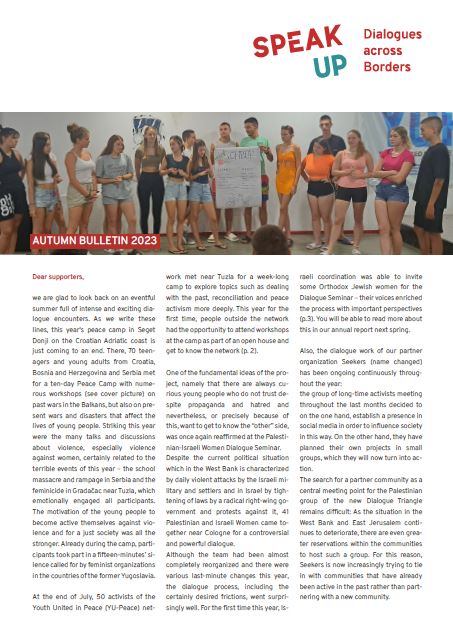
Dear supporters,
we are glad to look back on an eventful summer full of intense and exciting dialogue encounters. As we write these lines, this year’s peace camp in Seget Donji on the Croatian Adriatic coast is just coming to an end. There, 70 teenagers and young adults from Croatia, Bosnia and Herzegovina and Serbia met for a ten-day Peace Camp with numerous workshops (see cover picture) on past wars in the Balkans, but also on present wars and disasters that affect the lives of young people. Striking this year were the many talks and discussions about violence, especially violence against women, certainly related to the terrible events of this year – the school massacre and rampage in Serbia and the feminicide in Gradačac near Tuzla, which emotionally engaged all participants. The motivation of the young people to become active themselves against violence and for a just society was all the stronger. Already during the camp, participants took part in a fifteen-minutes’ silence called for by feminist organizations in the countries of the former Yugoslavia.
At the end of July, 50 activists of the Youth United in Peace (YU-Peace) network met near Tuzla for a week-long camp to explore topics such as dealing with the past, reconciliation and peace activism more deeply. This year for the first time, people outside the network had the opportunity to attend workshops at the camp as part of an open house and get to know the network (p. 2).
One of the fundamental ideas of the project, namely that there are always curious young people who do not trust despite propaganda and hatred and nevertheless, or precisely because of this, want to get to know the “other” side, was once again reaffirmed at the Palestinian-Israeli Women Dialogue Seminar.
Despite the current political situation which in the West Bank is characterized by daily violent attacks by the Israeli military and settlers and in Israel by tightening of laws by a radical right-wing government and protests against it, 41 Palestinian and Israeli Women came together near Cologne for a controversial and powerful dialogue.
Although the team had been almost completely reorganized and there were various last-minute changes this year, the dialogue process, including the certainly desired frictions, went surprisingly well. For the first time this year, Israeli coordination was able to invite some Orthodox Jewish women for the Dialogue Seminar – their voices enriched the process with important perspectives (p.3). You will be able to read more about this in our annual report next spring.
Also, the dialogue work of our partner organization Seekers (name changed) has been ongoing continuously throughout the year:
the group of long-time activists meeting throughout the last months decided to on the one hand, establish a presence in social media in order to influence society in this way. On the other hand, they have planned their own projects in small groups, which they will now turn into action.
The search for a partner community as a central meeting point for the Palestinian group of the new Dialogue Triangle remains difficult: As the situation in the West Bank and East Jerusalem continues to deteriorate, there are even greater reservations within the communities to host such a group. For this reason, Seekers is now increasingly trying to tie in with communities that have already been active in the past rather than partnering with a new community.
